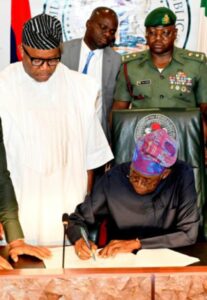

By Goodluck Ikiebe in Abuja.

President Bola Tinubu has enacted the new Minimum Wage Act into law.
The signing took place at 2 p.m. in the Council Chamber of the Presidential Villa, Abuja. The ceremony was attended by Senate President Godswill Akpabio, Deputy Senate President Barau Jibrin, and House Leader Prof. Julius Ihonvbere, who represented Speaker Tajudeen Abbas.
This development follows an agreement made nearly two weeks ago between President Tinubu and organized labor unions, including the Nigeria Labour Congress and the Trade Union Congress of Nigeria, to set the new minimum wage at ₦70,000.
The Senate President, Akpabio ,who Akpabio briefed State House Correspondents after the signing ceremony, said:, “I’m ecstatic.
” I’m excited about the Nigerian worker and the national minimum wage amendment, which applies to the whole nation: The Federal Government, the states, the local governments, the private sector, and even individual employers.
“We are not only doubling the minimum wage from ₦30,000 to ₦70,000 but also adding additional benefits.”
He clarified that the new minimum wage is set at ₦70,000, meaning “No Nigerian worker will be paid less than ₦70,000 for their services from today. This Act applies nationwide.” Akpabio also noted that employers have the option to pay more if they are able.
He praised the swift action of the National Assembly, which passed the bill in a single day out of enthusiasm for the change.
Akpabio also announced that President Tinubu is expected to sign the 2024 budget amendment bill into law on Wednesday, July 31, 2024. This amendment will address the financial implications of the new minimum wage.
On July 15, the Federal Executive Council instructed the Minister of Budget and Economic Planning to prepare a bill to amend the 2024 Budget. A week later, President Tinubu requested the Senate to amend the 2024 Appropriation Act and the 2023 Finance Act by increasing the budget by ₦6.2 trillion.
The Senate approved this amendment, raising the national budget for the year from ₦28.7 trillion to ₦35.055 trillion.
Edited by Dada Ahmed.


